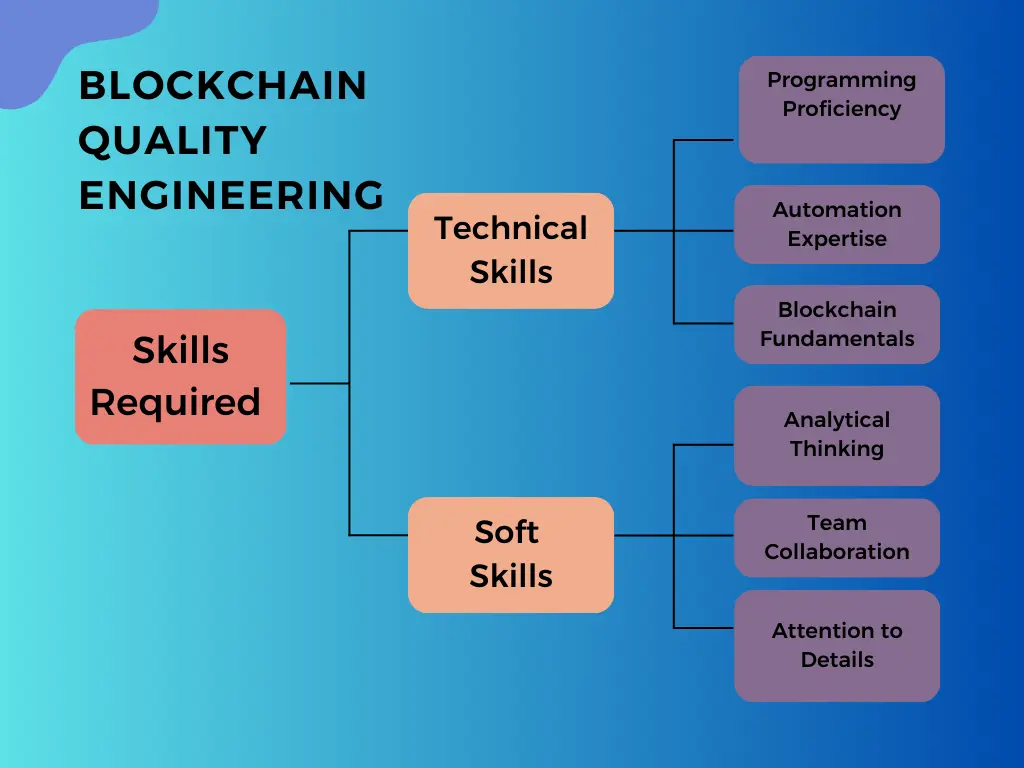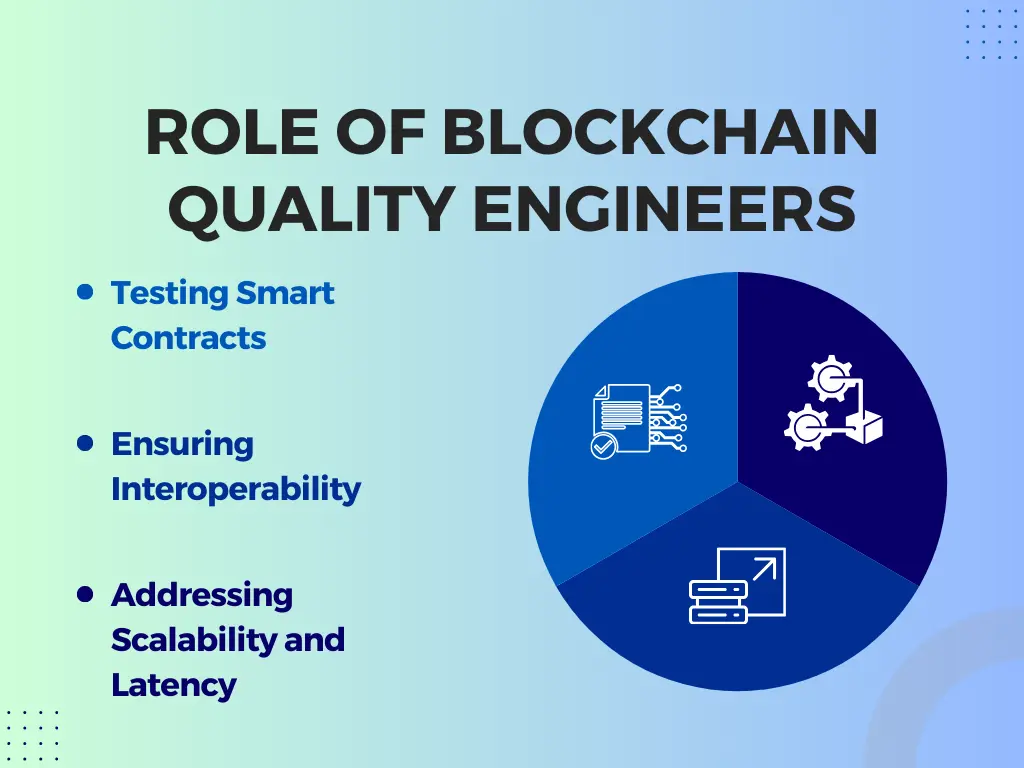Blockchain Quality Engineers play a critical role in ensuring that blockchain systems remain secure, efficient, and reliable. With the blockchain market expected to grow from $10.02 billion in 2022 to $163.83 billion by 2029, demand for skilled professionals is increasing rapidly. Industries like finance, healthcare, and supply chains rely on blockchain solutions, making this role essential for innovation and reliability.
This blog explores the responsibilities of Blockchain Quality Engineers, required skills, career opportunities, and the field's future evolution. Whether you're a tech professional exploring blockchain or seeking a career transition, this guide provides actionable insights into the significance of this role and how to excel in it.
The Role of Blockchain Quality Engineers
Blockchain Quality Engineers focus on rigorous testing to ensure decentralized systems operate seamlessly. Their key responsibilities include:
Testing Smart Contracts: Engineers validate smart contract functionality to prevent vulnerabilities, ensuring they execute correctly.
Ensuring Interoperability: They test cross-chain compatibility, enabling blockchain networks to communicate efficiently.
Addressing Scalability and Latency: Engineers identify and resolve performance bottlenecks to enhance user experience.
In decentralized finance (DeFi), for example, quality engineers safeguard millions of dollars locked in smart contracts. Similarly, in non-fungible token (NFT) platforms, they ensure secure transactions and smooth operations.
Major updates, such as Ethereum's shift to Proof-of-Stake, rely on thorough testing by Blockchain Quality Engineers to mitigate risks. These professionals are integral to maintaining user trust and ensuring the reliability of blockchain networks.
Career for Blockchain Quality Engineers
Blockchain engineering offers a clear and progressive career path:
Blockchain QA Analyst: Entry-level professionals perform manual testing of blockchain applications and smart contracts. They identify bugs, test basic functionalities, and ensure systems meet initial quality standards.
Blockchain QA Engineer/Test Automation Engineer: Mid-level professionals create automated testing frameworks and execute advanced tests. They check performance, security, and stability using tools like Selenium and blockchain-specific testing frameworks.
Blockchain Test Architect: Senior professionals lead QA teams, design testing strategies, and build scalable pipelines for large blockchain ecosystems. They also make key decisions about testing tools and processes to meet organizational goals.
Industries Hiring Blockchain QA Engineers
Blockchain QA engineers find roles in various industries:
Finance: Engineers ensure secure and efficient transactions for banks and DeFi platforms.
Healthcare: They test blockchain systems that handle patient data, ensuring compliance with privacy laws.
Supply Chain: Engineers verify the accuracy and transparency of logistics systems.
Entertainment: They ensure the reliability of NFT marketplaces and gaming platforms built on blockchain.
Top Employers for Blockchain Quality Engineer
Companies across different scales actively hire blockchain QA engineers:
Startups: Firms like Alchemy, Chainalysis, and Polygon offer innovative and challenging roles.
Corporations: Companies like IBM, EY, and Deloitte hire blockchain QA experts for enterprise-level projects.
Salary Insights Blockchain Quality Engineers
Blockchain QA engineers earn competitive salaries:
Entry-level roles: $70,000–$90,000 annually.
Mid-level positions: $90,000–$120,000 annually.
Senior roles: $130,000–$180,000 annually, with higher salaries in tech hubs like Silicon Valley.
This career path provides steady growth opportunities and high demand for skilled professionals.
How Blockchain Quality Engineering is Evolving
Blockchain quality engineering is advancing rapidly to address new technology demands and market needs. Here's a detailed look at its progression:
Automation is Key
The complexity of blockchain systems requires efficient testing. Automation tools like Truffle, Hardhat, and Cypress help reduce manual work while ensuring accurate and consistent testing for smart contracts and networks. These tools support scalable, high-quality applications across industries.
Strengthening Security
Security remains a core focus for blockchain QA engineers. Methods include:
Penetration Testing: Simulating attacks to detect and fix vulnerabilities before deployment.
Cryptographic Audits: Checking cryptographic algorithms and their implementations for weaknesses.
These steps ensure blockchain solutions are safe and reliable, minimizing risks from external threats.
Adapting to New Technologies
Blockchain testing is evolving alongside technologies like AI, IoT, and quantum computing:
AI-Enhanced Testing: AI tools analyze potential vulnerabilities and improve test accuracy, making processes faster and more reliable.
IoT and Blockchain: Engineers test data accuracy and scalability in real-time for IoT applications, especially in smart cities and industries.
Quantum-Safe Practices: Engineers work on future-proofing cryptography to prepare for quantum computing advances.
(4) Compliance with Regulations
Blockchain adoption in regulated sectors means meeting standards like GDPR (data privacy), HIPAA (healthcare), and MiCA (crypto-assets). Engineers ensure blockchain solutions comply with these rules, making them suitable for healthcare, finance, and supply chain industries.
Blockchain Engineering Courses and Certifications
Blockchain QA engineers can stay current with these resources:
Courses:
Blockchain QA Masterclass on Udemy
Certifications:
Certified Blockchain Security Professional (CBSP)
Blockchain QA is evolving quickly. Engineers who stay updated on tools, technologies, and regulations will be best positioned to succeed in this field.
Skills Required to Succeed in Blockchain Quality Engineering
To excel as a Blockchain Quality Engineer, professionals need a mix of technical and soft skills:

Technical Skills for Blockchain QA Engineers
Programming Proficiency: Knowledge of languages like Solidity, Python, and JavaScript.
Automation Expertise: Familiarity with tools like Selenium, Truffle, and Hardhat.
Blockchain Fundamentals: Understanding of blockchain architecture, consensus mechanisms, and cryptographic principles.
Soft Skills
Analytical Thinking: Ability to identify and solve complex technical issues.
Team Collaboration: Working effectively with developers and stakeholders.
Attention to Detail: Ensuring high accuracy in testing processes.
Certifications like Certified Blockchain Security Professional (CBSP) and training programs such as the Ethereum Developer Program by ConsenSys Academy help professionals build and validate these skills.
Future Opportunities in Blockchain Quality Engineering
The blockchain industry’s rapid growth opens exciting avenues for QA engineers:
Digital Twins: Engineers use simulations to predict system performance and optimize applications before deployment.
Specialization in Emerging Areas: Opportunities in quantum-resistant cryptography, multi-chain testing, and decentralized identity verification are expanding.
Global Demand: Countries like the United States, Singapore, and Switzerland lead the way in blockchain adoption, offering abundant job opportunities.
Job platforms like CryptoJobs and AngelList provide access to blockchain-specific roles. Professionals who stay updated with emerging trends and continuously enhance their skills will find themselves well-positioned for long-term success.
Conclusion
Blockchain Quality Engineering is a critical field shaping the future of decentralized technologies. With industries adopting blockchain at an unprecedented pace, the demand for skilled QA engineers will only increase. By mastering technical skills, staying informed about industry trends, and leveraging global opportunities, professionals can build rewarding careers in this domain.
Whether you're just starting or looking to advance in blockchain quality engineering, this is the perfect time to join a growing and impactful field.


